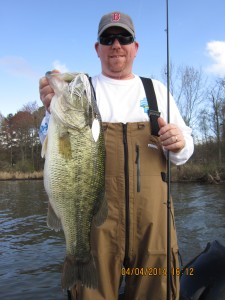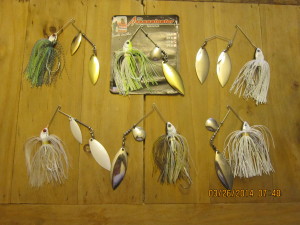Seven Great Locations and Techniques for Spinner Baits
It’s been said that you can use a spinner bait just about everywhere and under any conditions…I believe that to be fact. Anglers can fish this bait in everything from shallow water to deep summer time ledges. We fish it in open water or around heavy timber-grass-rock and other obstacles. You can burn it-slow roll it-crawl it or use a yo-yo retrieve. Here is seven proven locations and techniques in which I employ a spinner bait. Nothing is absolute and this is just a few suggestions and I’m sure there are other techniques and locations that might work even better for you on the water. To find those it just takes time on the water and patience.
1) Grass: Absolutely my favorite area to fish spinner baits is in standing weeds along the main and secondary channels on Lake Guntersville. Some of these weed lines are in very shallow water-some will extend out into 10-14 feet of water or more. In May, Shad use these grass lines located on flats very near channel drops to spawn. Focus on these key areas early and late in the day as well as cloudy days. As the sun comes up I concentrate on the outside “deeper” edges (the shady side) of the grass weaving the spinner bait through as much of the vegetation as possible. On windy days when it is blowing directly into the weeds, bass will stage more to the out side edges of the weed line. When this is the situation I always start there no matter the time of day or what amount of cloud cover I have. Lure speed and technique varies you may have to adjust several times before finding what the fish want. I will normally start with a yo-yo retrieve working the entire water column; most strikes come on the fall. One of my favorite spinner baits for grass lines is the Assassinator “Clacker” Spinner Bait…this unique spinner bait is designed so that the blade actually hit together causing and erratic action followed by one of the most vicious spinner bait strikes and angler can get.
2) Lay down Timber: On lakes such as Tim’s Ford or the upper end of Lake Guntersville fallen timber can be the only type of cover a bass has to ambush prey. Some of the limps will be visible while much of it may not. On Tim’s Ford, the top of the tree can be over water as deep as 60 foot or as shallow as 4 foot. On Lake Guntersville fallen timber provides a great current block offering a great location for bass to rest. Some of this timber will remain stationary all the time. Some of it will move with the rise and fall of the lake level. Absolutely never pass up fallen timber in the backs of coves, pockets or timber that is wedged in and around docks and piers. Anglers should always make repeated casts to the shaded portion of the timber trying to stay as parallel as possible. Work the timber completely-pick it apart section by section starting at the outside edges first. Let your spinner bait helicopter (free-fall) down in and around intersections of limbs where it is attached to the trunk. Hold on!!
3) Stump Fields: First, good pair of polarized sunglasses are a must for fishing stumps. On visible stumps, I always make my cast on the shaded side well beyond the stump. By casting past the stump you are less likely to spook the fish and you can work the side and back of the stump at the same time. In some cases you’ll need to crash the spinner bait into the stump. Some stumps have very little root system attached-while others might have an extensive system. Guntersville and Tim’s Ford are full of “Text Book” example of stumps situated directly on a creek channel bank or bluffs. Many of the stumps were 2 to 5 feet across in 4 to 25 foot of water and some have extensive roots still attached. Areas like these will produce fish over and over again through out the year.
4) Bluffs: One of first mistakes that many fishermen make is staying too far off the bluff wall with their boats. I have found to fish these areas correctly no matter what the water color is you have to fish parallel so close that you can reach out and touch the bluff with your hands. By doing this you keep your bait in the strike zone all the way. Work the ledges of these bluffs by slow rolling the spinner bait trying to stay in contact with the rock and wood as much as possible. Watch for changes in the bluff wall such as indentations and rock slides. Indentions are recessed areas in the face of the wall that will give you two defined corners for bass to ambush from as well as the recessed area that can hold timber or a series of stair step ledges. Rock slides on a bluff are almost always a signal that the water around the side will be shallower and hold bait fish and crayfish continually.
5) Rip Rap Areas: Much like fishing a bluff you should make your cast parallel to the structure. Rip rap areas hold bait fish-crawfish and cover for bass. While most of these areas tend to look the same look for areas of the rip rap that is different from everything else around it. Pay special attention to small points that extend out even slightly, Logs that have wedged themselves in close to the bank and weed lines that extends a foot or more out from the rocks. It’s this type of areas that seem to hold the most fish. If the section of rip rap you are fishing has a culvert or bridge on it, be sure to work all four corners and pillars/supports of the bridge. You will also need to determine if there is current coming through the culvert or bridge. If current is present the four corners of rip rap under the bridge tend to be more productive.
6) Points: Most lakes will have “Points” located in various areas of the lake. Using a spinner bait on points can be some of the most rewarding areas of any lake to fish. Points offer bass a change in depth which leads from shallow to deeper water and helps hold bass on them year around. Points that extend out into the lake and then take a sudden drop tend to be more productive than others. Position the boat over the deeper water but close enough to reach the shallow portion of the point with a long cast. To effectively fish these areas you must make repeated casts going a little deeper and a little deeper to ensure that I have worked to area completely. I then move my boat where I can work both sides and the center portion of the point. If you are night fishing slow rolling a ¾ ounce Black/Red Spinner Bait with a number 6 or 7 single Colorado Blade. Points especially if they have a brush pile or a few stumps on them can be good all year around-spring -summer-fall and winter.
7) Boat Docks: I refer to fishing docks as going to the mattresses’ simply because docks can offer bass Shade, Cover, and a food source such as bait fish. This may seem evil but watch for crappie fishermen on select docks…these docks normally are more productive that others. Work the spinner bait parallel slowly against outside edges of the dock-letting it drop and then pick it back up varying the speed. Always work inside the covered area of the dock as much as possible. Many times if bass are suspended under the dock the helicopter action of the spinner bait blades will provoke a reaction strike.
Equipment and Rigging: For almost all locations and applications, I will use 12 pound test Vicious Ultimate co-ploy spooled on a 5.4-1 or 6.4-1 Lew’s reel mounted on a 6’9” to 7”3” Medium Heavy Duckett Fishing Rod. I will change up to 30 or 50 pound test Vicious Braid when the grass gets up thick such as in late June. The medium heavy rod provides for a good feel of the spinner blades turning as sometimes you going to find the first hint of the bite will be loss of the vibration of the blades. As for spinner baits, I tend to stay with White or White Chartreuse in 3/8 to ¾ ounce sizes unless I’m fishing deep ledges than you will need a 1-1 ½ ounce to get down to the depth you need. Brands include Assassinator, Terminator and Punisher Spinner Baits.
Spinner baits have been and always will be one of the most versatile baits that you will ever have in you tackle box. Hopefully, you will employ some of the tactic’s above which I know for a fact can result in productive days on the water.
Capt Jake Davis is a USCG Licensed Professional Fishing Guide on Lake Guntersville and Tim’s Ford. Visit www.midsouthbassguide.com or call/email 615-613-2382, msbassguide@comcast.net


